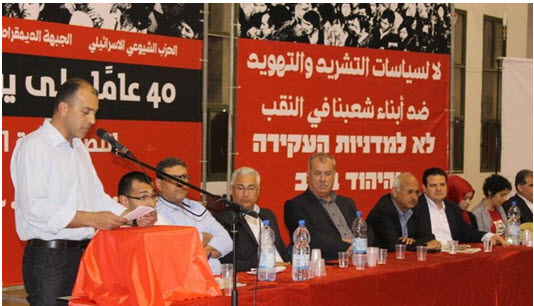Arab-Palestinians in Israel marked the 40th anniversary of Land Day on Wednesday, March 30, with protests and the waving of Palestinian flags in the Galilee and the Negev. As it has in years past, The High Follow-Up Committee for Arab Citizens of Israel, which annually organizes the protests, called this year for a general strike in the Arab sector. Former Hadash MK Mohammed Barakeh, chairman of the High Follow-Up Committee, told the Turkish press agency Anadolu that Land Day demonstrations were to take place in several Arab cities and villages in Israel. “Arab-Palestinians will mark this year’s Land Day with massive demonstrations in Arrabe in Galilee and in Um al-Hiran village in southern Israel,” Barakeh said. “After 40 years of the crime against our people in the Galilee, we are still holding marches to deliver the message that we will remain on our land and that we will not leave,” he said.

Last Friday, March 25, hundreds of activists participated in a rally in the city of Sakhnin, to commemorate the 40th anniversary Land Day. The event was organized by the Communist Party of Israel, the Young Communist League and Hadash. (Photo: Al Ittihad)
Land Day is held every year on March 30 to commemorate the 1976 deaths of six Arab youths from the north of the country at the hands of Israeli forces during mass demonstrations against a government decision to confiscate Arab lands as part of its ongoing effort to “Judaicize” the Galilee. The government decision to confiscate the land was accompanied by the declaration of a curfew to be imposed on the villages of Sakhnin, Arraba, De’ir Hanna, Tur’an and Kabul, effective from 5 p.m. on March 29, 1976. Based on a decision of the Central Committee of the Communist Party, Arab leaders such as the late Tawfiq Ziad, the first communist mayor of Nazareth, called for a day-long general strike and protests against the confiscation of lands to be held on March 30. The government declared all demonstrations illegal and threatened to fire government workers, such as schoolteachers, who encouraged their students to participate in the demonstrations.
This year’s central event, held in the town of Arrabe, was attended and addressed by a number of Joint List MKs, Arab leaders, and political activists. In the Negev, hundreds of protestors marched in the Arab-Bedouin unrecognized village of Um al-Hiran located near the Shoket junction. The residents of the village of Um al-Hiran were uprooted from their original land near Beit Kama and transferred to the village’s present location in 1956, by order of the Israeli military governor. Now, the State of Israel seeks to transfer them again, this time into the crowded town of Hura, where hundreds of young couples are still waiting for land on which to build their homes. The village of Um al-Hiran is to be demolished in order to build a new Jewish settlement “Hiran”, on which construction work has already begun. The residents of Um al-Hiran only want to remain where they are as is, or be integrated as a neighborhood in the settlement of Hiran. The State of Israel refuses both options.
Last Friday, March 25, hundreds of activists participated in a rally, in the city of Sakhnin, to commemorate the 40th anniversary of Land Day. The event was organized by the Communist Party of Israel, the Young Communist League and Hadash. Addressing the participants in the rally citizens Mohamed Barakeh condemned far-right government’s plans aimed at tightening the noose around the Arab citizens of Israel and called for standing united against all attacks. In his speech, MK Iman Odeh criticized the government’s recent decision to build a new city for the Arab population on lands belonging to Arab residents of the town of Jadeidi-Makr. This is the first such initiative by the government since 1948. “We need such a city, but establishing a city requires partnership and vast lands; establishing a misshapen one at the expense of people’s private land is not what’s needed,” Odeh said, warning that such an Israeli plan would prevent Jadeidi-Makr’s own development.
Related:


